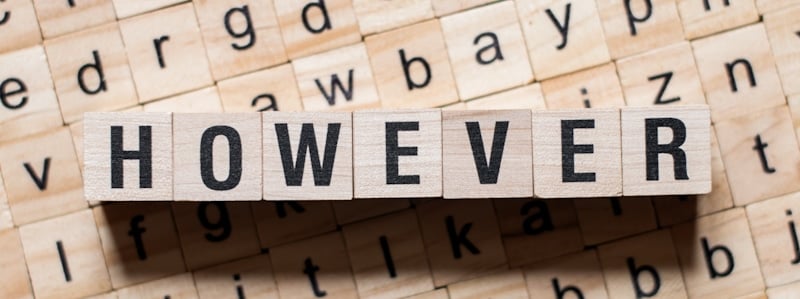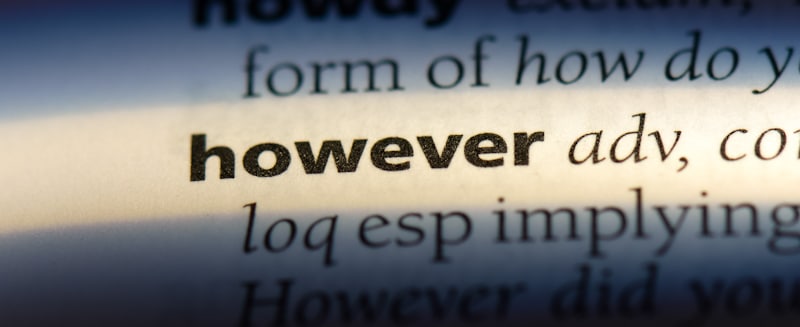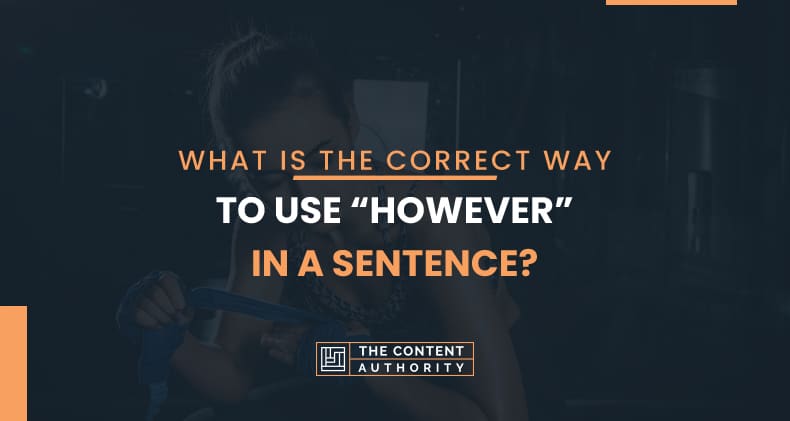The term “however” has been around as a valid word in English for centuries. However (no pun intended), its usage in texts is still not straightforward and could throw even some established writers in a minor state of delirium. The constant comparison between conjunctions such as “but” and “and” only complicates things further.
The adverb “however” means “to whatever extent or degree”. It’s typically used in sentences to merge two independent clauses (or potential sentences) to make a single, compound sentence. The term could be used in the middle of a sentence, with or without punctuation. It can also begin a statement.
Using “however” in texts is not as straightforward as it seems. There are quite a few things to consider, and the fact that the word can assume different meanings based on how and where it gets placed in a text adds to the confusion. Read on to get a more in-depth look at the term, how to use it in texts the correct way, and lots more.

“However” – Meaning
The word “however” means “in whatever way or manner”. It also means or could be used in place of “on the other hand”, “on the contrary”, “despite”, “how in the world”, etc, in texts. A few other synonyms or related terms of the word include “even so”, “nevertheless”, “howbeit”, “notwithstanding”, “withal”, etc.
The term has been used in English as an adverb since the 14th century. Modern English has also been around since then. In other words, the word was born right alongside the variant of English people currently use.
Talking about the past, “however” also meant “although”. But that meaning is now considered archaic or incorrect.
Using “However” in Texts
Generally, “however” is used in a sentence to say something that contrasts with or is different from a previous statement.
The word is usually incorporated into texts as an adverb or conjunction (kind of), and the punctuation or comma usage varies accordingly.
When used as an adverb (usually before another adverb or an adjective), “however” usually begins a sentence. For example:
- However hard he tried, he couldn’t convince her.
When used as a “conjunctive adverb”, the term brings together two simple sentences or independent clauses to form a new sentence. The two clauses are invariably opposing or in contrast with each other. For example:
- The manufacturer claimed the phone was splash-resistant; however, it still wasn’t keen to officially market it as a “waterproof” offering.
When two independent clauses come together to make a compound sentence, “however” is used with a semicolon (;) before it and a comma (,) right after.
“However” is not your standard “conjunction”. Proper conjunctions such as “but”, “and”, “since”, etc., do not require a semicolon. They certainly do not need a comma right after them.
The conjunctions usually have just one comma before them when used somewhere in the middle of a sentence. When they are not merging two dependent clauses or one independent and one dependent clause, even the solitary comma could be missing.
When “however” is used as a conjunction or conjunctive adverb, the semicolon plays the “conjunction” role equally, if not more than “however”.
But “however” does exhibit a relationship between two clauses as more rhetorical or semantic than grammatical. It’s, therefore, preceded with a semicolon. But when “however” is not used as a “conjunction” or doesn’t link two independent clauses, it has no preceding semicolon.
Here are a couple of sentences that further explain the same. The first sentence uses “however” as conjunction. The following sentence breaks the same compound sentence into two individual sentences, keeping the “however” and communicating its purpose/significance.
- The iPhone 12 Mini is the “compact flagship” device buyers have been yearning for; however, the phone’s sales have been poor, which may not inspire an iPhone 13 Mini or whatever Apple would have likely named the next generation of the phone.
- The iPhone 12 Mini is the “compact flagship” device buyers have been yearning for. However, the phone’s sales have been poor, which may not inspire an iPhone 13 Mini or whatever Apple would have likely named the next generation of the phone.
When used at the start of a sentence, “however” has just a comma after it. For example:
- However, there was no need for her to apologize.
In the above sentence, “however” represents a contrast. But because it’s used in a simple sentence or the text right before it is unknown, it may be difficult for sentences beginning with “however” to stand on their own or convey complete meaning.
It’s, therefore, advised not to start sentences with “however” and resort to compound sentences instead. Besides the “sentence fragmentation” issue, using “however” at the very beginning makes the term seem a lot more significant than the actual sentence it’s a part of.

But using “however” at the start of a sentence is not controversial if it doesn’t have a comma after it, or it doesn’t seem like it’s the continuation of or based on a sentence immediately prior. For example:
- However long it takes, I’ll wait for it to complete.
When “however” is not used at a sentence’s start and does not bring two independent clauses together, it is accompanied by two parenthetical commas. For example:
- It is, however, tough to say a well-made replica Rolex apart from the real deal.
- It is, however, unlikely the prices will continue to rise.
Can “However” Be Used without Commas?
It’s not rare to see “however” used without commas, regardless of whether it’s positioned at a sentence’s beginning or in the middle of a text. For example:
- However hard she tried, she couldn’t resist the temptation the cake presented and eventually broke her fast.
- I’ll stay put however long it takes.
- You cannot add ingredients however you want to.
- However you see it, it’s not good news.
When used in sentences without a comma, “however” usually denotes “irrespective of”, “regardless”, “whichever/whatever way”, etc.
Comparing “However” with “But” and “And”
To understand how “however” is not the same as “but” and “and”, here are a few example sentences:
- The company made a net profit of 5% in the second quarter of 2018, but it’s not necessarily great news for the firm, which made 10% in net profit in the same period the previous year.
- The company made a net profit of 5% in the second quarter of 2018; however, it’s not necessarily great news for the firm, which made 10% in net profit in the same period last year.
Though punctuation usage between the two varies, both “however” and “but” bring together contradicting or negative statements. The conjunction “and”, on the other hand, is not used to bring together differing views.
To use “and” in the sentence above, the sentence’s message must be upended. For example:
- The company made a net profit of 5% in the second quarter of 2018, and it’s set to make more in the coming quarter.
Possibly, the only similarity between “but” and “and” (besides the two being conjunctions) is the punctuation usage. Both do not have commas after them, and they also usually have just a comma right before when merging two independent clauses instead of a semicolon, unlike “however”.
Example Sentences with the Term “However”
The following are sentences incorporating the term “however” in different ways, with or without commas:
- However, there were several challenges.
- I like the dress; however, it’s available in just one color.
- I have lots of things to do tonight; however, I am going out with her because I promised her I’d come.
- The CEO was quite confident of the product’s success. The board, however, wasn’t mighty convinced.
- Diamond mining is hugely profitable; however, there are quite a few risks involved in the trade.
- I am happy you are back. However, I hope you do not try to justify what happened last night.
- We are not going to cancel this trip under any circumstances. However, we hope the expenses do not go out of hand.
- We let them decorate their personal spaces however they choose to.
- Let her do it however she likes.
- I shall help you however I can.
- Some protestors, however, want the president to be a lot more aggressive in his stance.
- However, retail store owners resisted the ordinance and threatened to increase the price, cut employee salaries, and even shut some of their marquee stores.
- The team, however, made it to the top of the table after starting slow.
- However you sing it, it does not sound correct.
- The car was quite old and outdated. However, it managed to take us home safely.

Conclusion
“However” is a relatively versatile term, as far as its meaning is concerned and how it gets incorporated into sentences. It also can be placed in various positions in a sentence, with the punctuation changing accordingly.
Whether you use the term at the very beginning of a sentence, in the middle of it, and with or without a comma or a semicolon, the word “however” is not a conjunction.
It’s purely an adverb that can do conjunction duties when the need arises or when two independent clauses are a bit too loaded or complex for traditional conjunctions like “but” and “and” to glue or shoulder.
Frequently Asked Questions
Is it okay to put “however” in the middle of a sentence?
Of course, it is! This is one of the main uses of the word, however, it can also be used at the beginning of a sentence. (See what I did there?)
Do you put a comma before or after “however”?
If “however” is used in the middle of a sentence, then you put a comma both before and after the word. If used at the beginning of a sentence, you would obviously only use a comma after “however”.
Shawn Manaher is the founder and CEO of The Content Authority. He’s one part content manager, one part writing ninja organizer, and two parts leader of top content creators. You don’t even want to know what he calls pancakes.

